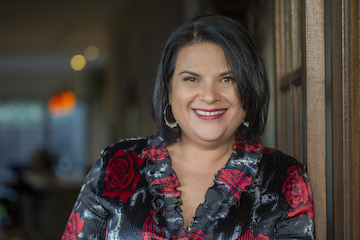 Successful entrepreneur Ludwina Dautovic was one of the guest speakers at the launch of Quest For Riches. I wanted to share with you more of her comments as they are so pertinent for anyone who wants to teach their kids the value of money. Ludwina kindly gave me her entire talk to publish here. Enjoy! If you’d like to share, please give credit. Ludwina Dautovic:
Successful entrepreneur Ludwina Dautovic was one of the guest speakers at the launch of Quest For Riches. I wanted to share with you more of her comments as they are so pertinent for anyone who wants to teach their kids the value of money. Ludwina kindly gave me her entire talk to publish here. Enjoy! If you’d like to share, please give credit. Ludwina Dautovic:
My adult children are 27 and 24. As a young mother I didn’t have a good example of how to teach our children about money. There was a continual message in my childhood home that we couldn’t afford things. My parents were generous with what they had, but they struggled financially and expressed that often.
Raising adults not children
As a young mother I had to figure it out myself. I came to the realisation that I was raising adults, not children and that became my benchmark for decision making. As adults they would have to be
self-sufficient and well-rounded people who could live and operate in the world on their own. They would require emotional intelligence and social skills and ideally, they would have a hunger for learning and be able to make and manage their own money.
We often taught our children through play, so when it came to money, we used the legendary Monopoly board game. We pulled out our household bills and used the play money to show the kids how much went to bills and food, and how much was left over. From this, they understood that you had to work for your money and be wise with how you spent it.
We used to play a game at the supermarket too. Once they were able to read, I’d give them my shopping list. They had to run around and find the item but make a financial decision about the best value item to buy, which wasn‘t always the cheapest or the smallest.
Jobs list
Both of our children had jobs to do at home. When they were physically able to help out, they did. We had a rewards board where they could earn stars for additional help they gave around the house. The basics, such as tidying their rooms, setting the table and putting their clothes in the laundry weren’t rewarded because those contributions were required and had to be done first. Once they were completed, there was another list of additional jobs they could choose from and those jobs would earn them pocket money. I believe it’s important that children understand the basics of household contribution and are not rewarded for that. I don’t see their adult flatmates giving them a dollar every time they put a dish in the sink!
Paid work
When they were about ten years old, they started earning their own money. At the time I was running a video production company. My son had an interest in video and wanted to learn how to edit. I taught him and then paid him for the work he did. He then developed a strong passion for film.
My daughter was offered a job playing with the neighbour’s child a few hours a week while the mother worked at home. She was only about ten at the time. She used to make a few dollars each time and every day she would put $2 in a jar. She would then use that money to buy something she wanted.
 Needs vs wants
Needs vs wants
My husband and I taught both our kids the difference between needs and wants. We provided everything they needed but anything they wanted they had to work for and buy themselves. Understanding the difference is important. E.g.: Computers are a need these days, however, an upgrade is a want – not a need. There’s a difference between clothes that are needs and wants. Understanding this, and having to work for what you want, helps your child reduce their desire for consumerism and keeping up with their friends.
Understanding the value of money
Teaching your child to understand needs vs wants and to work for what they want, teaches them the value of money. They understand the amount of effort that goes into working to have that item. When they do, they’re less likely to purchase items just because they want them. In our current climate, this is even more valuable than when my children were young. We didn’t have the internet or social media to contend with that exacerbates the problem.
BTW, saying no is often the greatest gift you can give your child. They’ll hear it a lot as an adult and need to learn how to deal with it.
The outcome as adults
Both of our children left home in their early 20s. It was a conversation we started in their teenage years to prepare their mindset for when the time arrived. Raising adults means they need to leave home to behind their childhood leave and form their own adult views and gain independence. Interestingly, they’ve never asked me for money as adults. They’ve both achieved and worked for significant life experiences. They’ve travelled, purchased big-ticket items such as vehicles and have paid for their independent lifestyles. When they’ve worked for their dreams, we’ve always contributed but it was always a surprise. They worked for what they wanted, and our contributions were extras. Once they achieved their goal, anything we gave them was a bonus that rewarded them for their own achievements.
The difference for me is whether we’re giving them a hand up or a handout. There’s always work in Australia. I don’t know any kid with a great attitude who couldn’t get a job in a fast food restaurant or a babysitting gig. If they have a good attitude, can be on time and can hustle, they’ll always have work.
 The future of work is changing
The future of work is changing
With the growth of the gig economy, young adults who can hustle and work independently across various platforms will do well. Guiding them to have an entrepreneurial mindset and the will to do whatever they do to the best of their ability will be the best gifts you can give them. My favourite game to play with them now is ‘What if?’. If they have an idea, no matter how ridiculous I think it might sound, we play ‘What if’ and explore the options and opportunities around it. With my husband and I both being entrepreneurs, our kids have lived and breathed that attitude every day.
The Room Xchange
There is also more than one way to gain access to needs and resources. Working for money is one way. You can also help out for what you need. That’s the model we’ve created at The Room Xchange. We understand that young people may not have access to the same financial opportunities that we did at that age and with the increase in living costs, your time can become your greatest asset. The Room Xchange enables people to contribute time and skills in ‘Xchange’ for food and accommodation. With good soft skills and some great life skills, they can Xchange their time and live for free. It will enable them to save around $18k a year and put the money towards something they want such as an overseas holiday, pay off student debt or buy a car.
Money beliefs
I don’t see limits when it comes to money. I believe that if you fully prepare yourself for a project or a business idea, the money will come. There are approximately $80 trillion dollars in the world. I see money as a river that runs above my head from right to left in a downward current and always flowing. I call it the money river. If you’re well prepared, there are people with the money who will want to invest in you. That’s what I believe and that has been my experience. I have successfully raised capital for my company before and I’ll do it again. I just need to ensure I create value, believe in what I’m doing, have a great attitude and am willing to work hard.
What are your money beliefs? It’s a good question to ask yourself as whatever you believe your children are likely to follow.
 Liliane’s book, Quest for Riches, is a fantastic tool to break down your money beliefs and those of your children. Once you have identified which character you are, you’ll be able to notice what you need to change.
Liliane’s book, Quest for Riches, is a fantastic tool to break down your money beliefs and those of your children. Once you have identified which character you are, you’ll be able to notice what you need to change.
Money is changing; currency is changing and there are now multiple ways to access money. It’s a tool to enable you to have and achieve what you want. You just have to understand it and be able to access it.
Ludwina on Facebook: www.facebook.com/Theroomxchange
on LinkedIn: http://www.linkedin.com/in/ludwinadautovic/
and her website: http://theroomxchange.com



Recent Comments